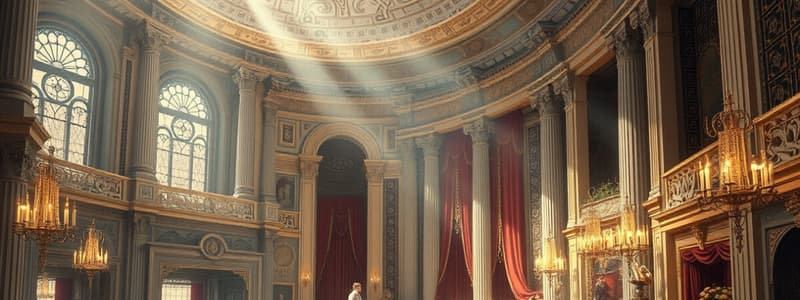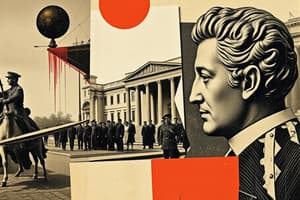Podcast
Questions and Answers
What does decorum refer to?
What does decorum refer to?
- A style of art
- An architectural technique
- A form of government
- Appropriateness of behavior or conduct (correct)
Who ruled France with an iron fist for 60 years?
Who ruled France with an iron fist for 60 years?
King Louis XIV of France
What does 'L'etat, c'est moi!' mean?
What does 'L'etat, c'est moi!' mean?
The state is me, I am the nation
What is Le Grand Siecle?
What is Le Grand Siecle?
Who was Cardinal Richelieu?
Who was Cardinal Richelieu?
What is the Academie Francaise?
What is the Academie Francaise?
What characterized Neoclassicism?
What characterized Neoclassicism?
Match the following unities with their definitions:
Match the following unities with their definitions:
What is verisimilitude?
What is verisimilitude?
What does 'Utile Dolci' refer to?
What does 'Utile Dolci' refer to?
What is purity of genre?
What is purity of genre?
Who is Pierre Corneille?
Who is Pierre Corneille?
What was the Confriere de la Passion?
What was the Confriere de la Passion?
What is Hotel de Bourgogne?
What is Hotel de Bourgogne?
What is Theatre du Marais?
What is Theatre du Marais?
What is Comedie Francaise?
What is Comedie Francaise?
Who was Sebastiano Serlio?
Who was Sebastiano Serlio?
What did Giacomo Torelli create?
What did Giacomo Torelli create?
What is single point perspective?
What is single point perspective?
What is the chariot-and-pole system?
What is the chariot-and-pole system?
What is the difference between descriptive and prescriptive criticism?
What is the difference between descriptive and prescriptive criticism?
What does didactic mean?
What does didactic mean?
Flashcards are hidden until you start studying
Study Notes
Key Terms in Neoclassicism and French Neoclassical Theatre
-
Decorum
- Refers to behavior and conduct suitable to a character's social status and situation.
-
King Louis XIV of France
- Ruled for 60 years with an absolute monarchy, asserting that this was the ideal government.
- Sought total control and awareness of his kingdom’s affairs.
-
"L'etat, c'est moi!"
- Translates to "The state is me," emphasizing King Louis XIV's belief in his absolute authority.
-
Le Grand Siecle
- The era of Louis XIV's reign, recognized as a peak of French political and cultural influence.
-
Cardinal Richelieu
- Served as chief minister, curbing noble power and imposing censorship on theatrical plays.
-
Academie Francaise
- Institution responsible for standardizing the French language and regulating theatrical productions.
Characteristics of Neoclassicism
- Neoclassicism
- An artistic movement beginning in the late 18th century, inspired by ancient Greek and Roman cultures.
- Featured themes and styles that revitalized classical artistic elements.
The Three Unities in Drama
-
The Three Unities
- Framework established by Louis XIV for theater:
- Unity of Time: Action occurs within a 24-hour period.
- Unity of Place: The setting remains confined to one physical location.
- Unity of Action: The narrative focuses on a single main plot without multiple subplots.
- Framework established by Louis XIV for theater:
-
Verisimilitude
- Essential for realism in theater, this quality denotes the appearance of truth and likelihood.
-
Utile Dolci
- The dual purpose of theater is to entertain and impart moral lessons to the audience.
-
Purity of Genre
- No blending of dramatic forms; tragedies are linked to royalty and conclude unhappily, while comedies involve commoners and typically end in happiness.
Prominent Figures and Institutions
-
Pierre Corneille
- Notable tragedian (1606-1684) known for "Le Cid" (1637), which drew criticism for not adhering to conventional rules.
-
Confrière de la Passion
- An association formed by amateur actors from Parisian merchants and artisans, dedicated to performing religious plays.
-
Hotel de Bourgogne
- The venue that housed significant theatrical performances.
-
Theatre du Marais
- Initially a tennis court, later converted into a theater, renowned for its unique stage design and renovations.
-
Comedie Francaise
- Recognized as the first national theater globally, established in 1680 post-Moliere's death, merging various acting troupes into a single entity.
Architectural Innovations
-
Sebastiano Serlio
- Italian architect who contributed to the design of the Palace of Fontainebleau.
-
Giacomo Torelli
- Innovated the stage with the 'pole-and-chariot' system for efficient scene changes.
Technical Aspects of Theatre
-
Single Point Perspective
- An artistic technique to create depth by having all objects recede towards a singular vanishing point.
-
Chariot-and-Pole System
- Developed by Giacomo Torelli, this system utilized poles and chariots for seamless scene transitions, enhancing stagecraft.
Criticism in Theatre
-
Descriptive vs. Prescriptive Criticism
- Descriptive: Observes and analyzes without judgement.
- Prescriptive: Establishes rules for language use that speakers are expected to follow.
-
Didactic Theatre
- Aims primarily to instruct and educate the audience through its content.
Studying That Suits You
Use AI to generate personalized quizzes and flashcards to suit your learning preferences.




